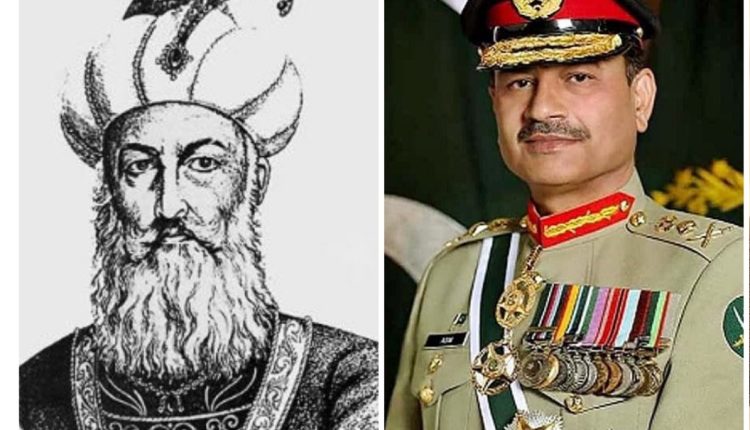by Muhammad Mohsin Iqbal
History has a curious way of drawing parallels across centuries, linking men of destiny whose courage and conviction transcend time. More than eight hundred years apart, two commanders — Sultan Muhammad Ghauri and Field Marshal General Syed Asim Munir — stood in moments of national trial and triumph, defending faith, honour, and sovereignty against formidable adversaries. Though separated by centuries, the essence of their missions and the spirit of their victories reveal a striking resemblance; both Chief faced India as the principal foe, both emerged victorious through strategy and perseverance, and both carried the banner of a Muslim commander whose faith guided his sword.
In the late 12th century, Sultan Muhammad Ghauri, the ruler of Ghor in present-day Afghanistan, rose from the rugged mountains to become the founder of Muslim rule in northern India. His historic encounter with Prithvi Raj Chauhan, the ruler of Ajmer and Delhi, marked a turning point in the subcontinent’s destiny. The First Battle of Tarain, fought in 1191, saw Ghauri defeated and wounded. But rather than surrendering to despair, he returned the following year — 1192 — with renewed resolve, reorganized forces, and divine faith. On the plains near Tarain once more, he crushed the Rajput confederacy and captured Prithvi Raj Chauhan. The victory at Tarain was not merely a military conquest; it opened the gates of India to centuries of Muslim rule and civilizational synthesis.
Eight centuries later, another commander from the soil of Pakistan mirrored this determination and strategic brilliance. On the nights of 8 and 9 May 2025, when India sought to test Pakistan’s resolve through a sudden and treacherous strike, General Syed Asim Munir, then serving as Pakistan’s Chief of Army Staff, led the nation through what became known as the One-Day War. The Indian offensive — planned with precision but motivated by arrogance — met with swift and decisive retaliation from Pakistan’s armed forces. Within hours, Indian military installations across the Line of Control were neutralized, and their aerial and ground incursions repelled. The night that was meant to bring Pakistan to its knees became the dawn of its renewed pride and unity.
Both Sultan Ghauri and Gen. Asim Munir displayed the attributes of leaders who believed that battles are not merely won by weapons but by faith, discipline, and conviction. Ghauri’s empire was born from the ashes of repeated defeats, while Asim Munir’s triumph emerged from years of subversive warfare waged by India through its proxies in Afghanistan. In both cases, the enemy underestimated the power of belief — a mistake history has never forgiven.
The geographical and political dimensions linking both personalities are equally compelling. Muhammad Ghauri ruled over Ghor, Ghazni, and parts of Afghanistan before extending his influence to India. His rule over Afghanistan was not just territorial; it represented the consolidation of a frontier that had long been the buffer and the bridge between Central and South Asia. Similarly, General Asim Munir, in his era, faced the challenge of restoring stability in the same Afghan frontier, which in modern times became the haven for Khawarij-inspired terrorist factions. These extremist, supported and financed by hostile agencies, particularly Indian intelligence networks, sought to destabilize Pakistan from Afghan soil — a strategy reminiscent of medieval alliances between Hindu Rajputs and Central Asian chieftains against emerging Muslim powers.
The modern commander’s challenge was not of cavalry and swords but of drones, intelligence, and hybrid warfare. Yet the essence remained unchanged — defending Pakistan’s ideological and territorial integrity against forces that refused to accept its right to exist in peace. General Asim Munir’s strategic doctrine combined deterrence with restraint, faith with professionalism, and national security with moral clarity. His background as a Hafiz-e-Quran and his reputation for integrity lent a spiritual depth to his leadership, recalling the piety and discipline of the early Islamic commanders.
Both Sultan Ghauri and Gen Asim embodied an unwavering trust in divine will while employing the finest strategies of their age. When Ghauri faced the Rajput confederacy, he used trickery, speed, and tactical flexibility to counter the traditional elephant corps of the Indian armies. His cavalry maneuvered with precision, turning what seemed an equal fight into a resounding victory. Likewise, General Asim Munir used the modern tools of warfare — surveillance, cyber intelligence, and swift precision strikes — to neutralize a numerically larger adversary. The speed and surprise of Pakistan’s counteroffensive during the May 2025 conflict echoed Ghauri’s own mastery of battlefield timing eight centuries earlier.
The aftermath of both victories was equally telling. Ghauri’s triumph laid the foundations for the Delhi Sultanate, which would last for centuries and nurture the composite civilization of the Indo-Muslim world. In the same way, Asim Munir’s leadership restored confidence to a nation fatigued by internal challenges and external conspiracies. The victory of May 2025 was not merely military — it reaffirmed the unity of Pakistan’s people and the resilience of its institutions.
It is said that leaders are born in the crucible of adversity. Sultan Muhammad Ghauri was once captured by his enemies but rose to become the conqueror of Hindustan. Gen. Asim Munir, too, faced challenges from political turbulence, terrorism, and regional hostility, yet emerged as the guardian of Pakistan’s sovereignty. Their lives reflect the principle that true commanders fight not for glory but for faith, duty, and the endurance of their nation.
In the final analysis, history does not merely repeat itself; it echoes the virtues of courage, faith, and perseverance through men who understand the weight of command. Sultan Muhammad Ghauri and Field Marshal Syed Asim Munir, though separated by eight centuries, stand as twin reflections in the mirror of time — soldiers of faith who defended their frontiers against India’s aggression, one through the sword and the other through strategy, both guided by conviction that victory belongs only to those who fight with righteousness and trust in Allah.

